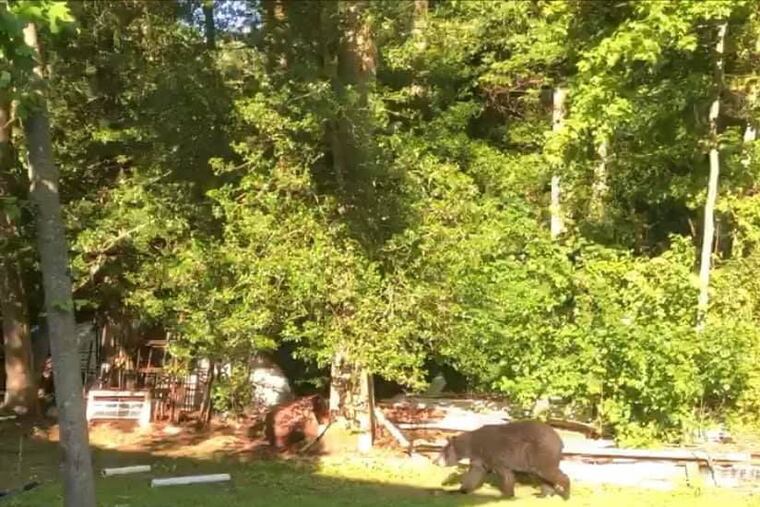Bear sightings jump this week in Philly suburbs, South Jersey
Bear sightings this week in suburban Philadelphia and South Jersey have resulted in a shelter in place request by police in one Bucks County community, and cautions being issued in other towns.

Black bears have been spotted over the last week roaming communities in Bucks and Chester Counties in Southeastern Pennsylvania and in Gloucester County in South Jersey, but experts say that doesn’t mean there has been a sudden explosion in the local bear population.
Rather it’s likely some young male bears are wandering away from their moms for the first time in search of a new home.
On Sunday, police in Lower Makefield, Bucks County, requested that residents of the Yardley Hunt Development shelter in place after a black bear sighting.
In West Goshen, Chester County, police didn’t even need to go the bear. It came to them.
“The elusive bear tried turning himself in early this morning, then thought differently as police approached. Last seen walking north on N Five Points Rd,” police said in a tweet on Sunday.
Dustin Stoner, education supervisor for the state Game Commission’s Southeastern Pennsylvania office, said wardens in Chester and Bucks Counties investigated both sets of sightings, and concluded it’s likely two different bears are roaming in each county. If one or both of the bears can be isolated in a safe location, the Game Commission will tranquilize them and move them to a better habitat.
“This is kind of typical,” Stoner said of the spring sightings.
He said young male bears go in search of new home ranges after being pushed out by other male bears, or by loss of habitat through development. Some will cross the Delaware River from New Jersey.
And, with security and phone cameras so prevalent, more sightings than ever find their way onto social media.
“As a whole, the bear population has increased over the last two decades,” Stoner said. “But it is not exploding."
Black bears, which can weigh from 200 to 600 pounds, are omnivorous, and most active at dusk and dawn in search of berries, corn, acorns, beechnuts, and even grass. Sometimes they’ll find table scraps in garbage cans.
In New Jersey, black bear sightings were up 33% from Jan. 1 through May compared with the same period last year. However, sightings have been down in recent years, with most in the rocky, hilly northwestern part of the state, where it’s easier for bears to find dens and lots of nuts.
But black bears have been spotted in all 21 New Jersey counties over the years. Overall black bear growth has increased since the 1980s, with the carnivores pushing their range south and east from the northwest.
On Saturday, a bear wandered into Elk Township, Gloucester County, so police asked residents to be cautious. The once mostly rural township is now dotted with suburban housing. Possibly the same bear moved on and was sighted this week in nearby communities, including Mantua Township and Clayton.
Residents theorized on Facebook groups this week that the bear might have been flushed out during a large fire at the Winslow Wildlife Management Area on the border of Camden and Gloucester Counties, though state officials could not confirm that. The New Jersey Forest Fire Service said that the fire burned 2,107 acres on May 20, and that the cause was still being investigated.
“The New Jersey Division of Fish and Wildlife is aware of bear sightings in Gloucester County and has been in contact with local police departments to provide advice,” Larry Hajna, a spokesperson for the state Department of Environmental Protection, said in a statement. “Though not certain at this time, the sightings may involve one bear and not multiple animals.”
Hajna said black bears are wary of humans and "should be disturbed as little as possible in order to give them an opportunity to find suitable habitat."
He suggests residents remove any potential food sources, as bears have an extremely keen sense of smell that can lure them to take up in certain neighborhoods.
Hajna offered some tips to keep bears away:
Wash garbage containers frequently with a disinfectant solution to remove odors. Put out garbage on collection day, not the night before.
Avoid feeding birds when bears are active. If you choose to feed birds, do so during daylight hours only and bring feeders indoors at night. Suspend bird feeders from a free-hanging wire, making sure they are at least 10 feet off the ground. Clean up spilled seeds and shells daily.
Remove all uneaten food and food bowls used by pets fed outdoors.
Clean outdoor grills and utensils to remove food and grease residue. Store grills securely.